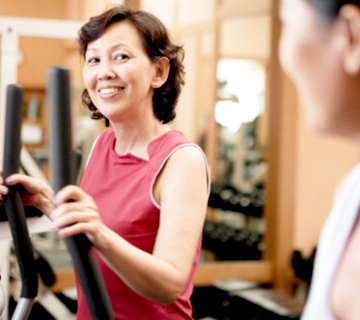Fit at 50: How It Can Improve Your Lifespan

It's safe to say that most of us would rather spend our golden years traveling, playing golf or enjoying our free time instead of paying for doctor's visits, medications or hospital stays. According to recent research, the difference depends on how fit you are at age 50.
Looking at nearly 20,000 healthy men and women with a median age of 49, a study published in the Journal of the American Medical Association found that 50 is the key age when it comes to thwarting off chronic conditions that can shorten our lifespans, including heart disease, stroke, diabetes and Alzheimer's.
Twenty-six years later, Medicare data was looked at to gauge the health of the original study participants. The findings? The fitter the participant was at midlife, the lower the incidence of chronic conditions later in life.
Scientists are still trying to understand the reasons why aerobic exercise can improve health in later years, but it's speculated that it has a lot to do with the fact that people tend to have lower degrees of other risk factors for chronic conditions.
If you're already 50 or older, know that it's never too late to improve your fitness. Here are three ways you can take action now-no matter how old you are.
Check with your healthcare provider before starting a new exercise program.
1. Ease into it
Don't rush into an intense exercise program if you've been inactive for many months or years. That's the quickest way to injure yourself. Instead, ease into a new program by being active just 10 minutes at time. Then gradually increase your workout lengths and intensity over time.
2. Make time for cardio
The American Heart Association recommends 150 minutes of moderate-intensity aerobic exercise each week. That's just 30 minutes a day, 5 days a week. Try going for a brisk walk after dinner, or inviting your friends to play tennis or golf. Just be consistent-that will help solidify your new exercise routine.
3. Stretch it out
As you get more active, it becomes important to improve your flexibility. Doing so can boost your range of motion and ultimately increase the calories you burn and your overall fitness. There are simple stretches you can learn to do after working out, or even before going to bed each night. Going to a yoga class a few nights a week will also help.